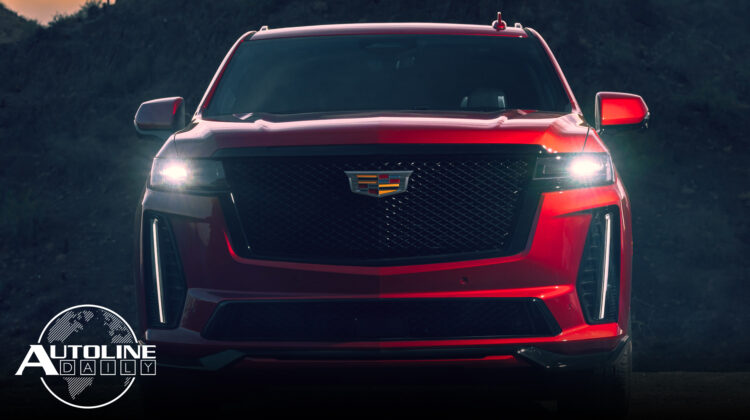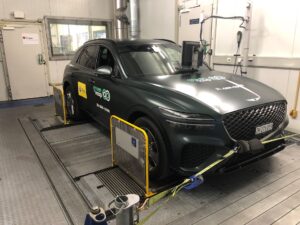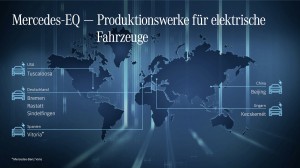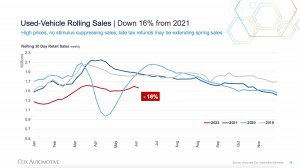
Listen to “AD #3357 – China Getting GM 'Halo' Vehicles; New Green NCAP Test Harder for ICEs; Used Car Market Shrinking” on Spreaker.
Follow us on social media:
Runtime: 9:08
0:07 EU Makes 2035 ICE Ban Official
0:40 China Getting GM ‘Halo’ Vehicles
1:25 Apple CarPlay Adds Fuel Purchases
2:51 New Green NCAP Test Harder for ICEs
3:52 BMW Kicks Off Share Buyback
4:25 Mercedes Starts EV Plant Transformation
6:07 Lithium Producers Oppose California Tax Proposal
7:19 Soaring Prices Drive Consumers from Used Cars
8:10 Material Inflation Having Big Impact on Automakers
Visit our sponsors to thank them for their support of Autoline Daily: Bridgestone, Intrepid Control Systems, MEDC and Schaeffler.
This is Autoline Daily, the show dedicated to enthusiasts of the global automotive industry.
EU WILL OFFICIALLY BAN ICEs BY 2035
Well, the European Union has made it official and is banning the sale of new combustion engine cars by 2035. But Germany got its wish by getting a provision that allows for the use of synthetic fuels after that date. Italy wanted to delay the target by five years but settled on a compromise that protects small manufacturers like Lamborghini, which allows them to avoid interim targets until the end of 2035. The deal also includes a cap and trade program to help reduce emissions.
CHINA GETTING GM ‘HALO’ VEHICLES
Chinese consumers will soon be able to get their hands on Corvettes and Escalades. GM signed a Letter of Intent and plans to invest $100 million in a new business unit, called GM Premium Import. It will provide a portfolio of vehicles that aren’t currently offered through its existing brands, including full-size pickups and SUVs as well as performance cars. The new unit is fully owned by GM and will be able to operate with a high level of autonomy. We wonder if that will have any impact on how these vehicles are branded. Will an Escalade still have a Cadillac badge and will a Camaro wear a bowtie? It will be interesting to see how they’re marketed.
APPLE CARPLAY ADDS FUEL PURCHASES
Apple is expanding its CarPlay app to include fuel purchases. The latest version will navigate users to the nearest gas station and allow them to pay for it right from the display screen. Car owners just need to download the app and enter payment information, after that you can activate the pump and pay for gas from the screen. The new feature will debut this fall. Sinclair Oil says it plans to use the new CarPlay technology. The software already allows users to pay for parking, EV charging and ordering food.
NEW GREEN NCAP TEST HARDER FOR ICEs
Several years ago NCAP, the organization that tests and evaluates vehicle safety, introduced Green NCAP, a new initiative that aims to answer the question, how green is your car? At first, it just looked at vehicle emission and efficiency performance from the point of charging or at the fuel pump and compared that to on-road performance. But now it’s making the test tougher. It’s taking a more ‘well-to-wheel’ approach, where it factors in how the energy source was extracted, produced and distributed as well as the construction of powerplants and refineries themselves. And its first rounds of tests show that it’s going to be much harder for ICE vehicles to earn a good score. The Audi Q4 e-tron, an electric SUV, earned 5-stars, but the most the ICE vehicles tested could earn was half that, 2.5 stars. And the Genesis GV70 only mustered 1 star due to its “significant fuel demand.”
BMW KICKS OFF SHARE BUYBACK
BMW announced it is buying back 2 billion euros worth of its shares. It plans to start purchasing the stock in July and be completed by the end of 2023. Most of the shares it buys will be canceled, which will reduce its share capital. And this is just the first step. The company plans to buy back 10% of its stock over the next five years. BMW says this will help maintain its strong investment grade rating and that it will benefit shareholders by increasing their earnings per share.
MERCEDES STARTS EV PLANT TRANSFORMATION
Mercedes has started its EV transition. Its entire global production network is starting to convert to electric. Some of its sites have already started producing BEVs, but by the middle of the decade all of its plants will be electrics. Of course, they won’t be fully electric at first. Sites like its plant in the U.S. will start making the EQS SUV and EQE SUV later this year, but will continue their ICE counterparts, the GLS and GLE.
Most electric cars still use a lead acid battery for all their low voltage requirements. That’s because they’re far less expensive than a lithium battery. But they’re heavy, which hurts EV range. Now a company called Clarios developed what it calls an absorbent glass mat so that it can make low-cost lithium batteries for low voltage applications. And we have Mark Wallace, the CEO of Clarios on Autoline After Hours at 3PM eastern time this afternoon to explain why every electric car will probably start using it.
LITHIUM PRODUCERS OPPOSE CALIFORNIA TAX PROPOSAL
One step forward, one step back. That’s what’s going with the U.S. effort to develop domestic mining sources for lithium used in EV batteries. The Salton Sea in California has large lithium deposits and several companies are setting up mining operations there. But Reuters reports that California is proposing to slap a $400 tax on every ton of lithium that’s mined there. And the more that gets mined, the higher the tax goes, topping out at $800 a ton. Right now a ton of lithium costs $77,500, so the tax, even at the top rate is about 1%. And the money from the tax would help out the Salton Sea area, which is one of the poorest in the state. But the mining companies want a tax levied on their corporate sales, not on each ton that gets mined. They worry that the price of lithium will drop. Even though it’s at $77,500 a ton today, two years ago it was only $6,750. If it drops back down to that the tax rate would be about 6%.
SOARING PRICES FORCE CONSUMERS FROM USED CARS
Have we finally hit the point that soaring used car prices are driving people out of the market? According to Cox Automotive, sales of used cars in the US market are down 16% compared to last year, while prices are up by almost the same amount. And it’s not about limited availability. Inventory of used cars is up 7%. It’s all about soaring prices. They’re up 15% over last year. The average price for a used car with 68,000 miles on the odometer is now just over $28,000. In a good year, about 40 million used cars are sold. This year it will drop to 37 million. So what are people doing? They’re fixing up the cars they’ve got. Cox Automotive is very bullish on the automotive service and repair sector.
MATERIAL INFLATION HITTING AUTOMAKERS HARD
How much is inflation of raw materials hurting automakers? A lot. A report from Alix Partners says that before the pandemic, the raw materials needed to make an ICE car was about $1,900. Today it’s about $3,600, or nearly twice as much. The biggest increase came from steel prices. But the raw material costs for BEVs are much higher, over $8,200.
But that’s it for today, thanks for tuning in.
Thanks to our partner for embedding Autoline Daily on its website: WardsAuto.com
Seamus and Sean McElroy cover the latest news in the automotive industry for Autoline Daily.










